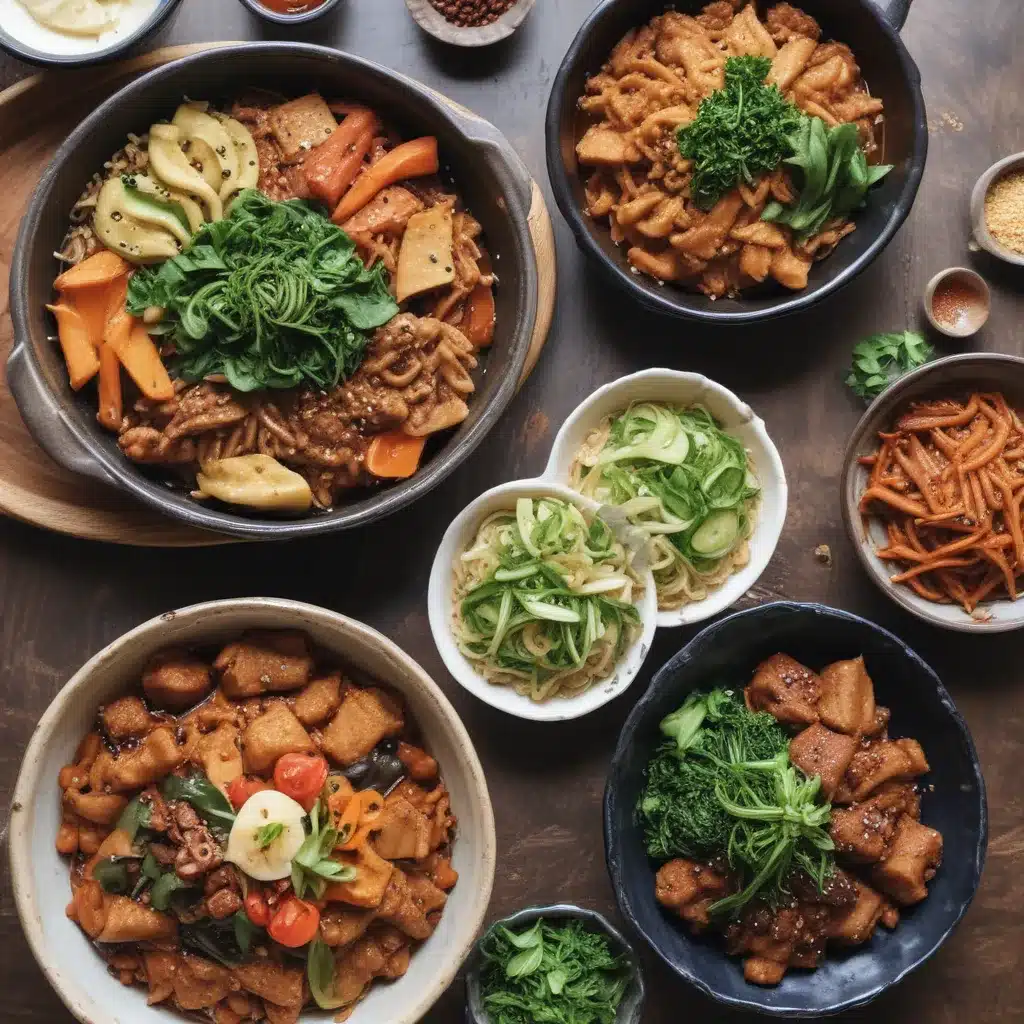
Discovering the Delights of Vegan Korean Food
As a self-proclaimed foodie and passionate advocate for plant-based eating, I’ve always been intrigued by the prospects of veganizing beloved Korean dishes. The rich, complex flavors and time-honored culinary traditions of Korea have long captivated my taste buds, and I’ve often wondered: Can these iconic dishes be reimagined in a vegan way, without sacrificing their authentic essence?
Well, my friends, after countless experiments in the kitchen and extensive research into the vibrant world of Korean cuisine, I can confidently say that the answer is a resounding yes! Vegan versions of Korean classics not only exist, but they are absolutely thriving in the bustling food scene of Boston.
Reimagining Kimchi: A Fermented Masterpiece
Let’s start with the cornerstone of Korean cuisine: kimchi. This fermented cabbage dish, with its bold, umami-packed flavors and signature fiery red hue, is a staple in every Korean household. But did you know that it can be easily adapted to suit the vegan palate?
The key to creating a truly authentic vegan kimchi lies in the fermentation process. By carefully selecting the right vegetables, spices, and fermentation techniques, skilled vegan chefs in Boston have managed to capture the essence of traditional kimchi, while completely omitting the use of fish sauce or shrimp paste. The result? A vibrant, tangy, and deeply satisfying vegan kimchi that can hold its own against any non-vegan counterpart.
One local vegan eatery, Korean Garden Boston, has particularly impressed me with their take on this revered dish. Their kimchi is a work of art, perfectly balancing the sweetness of napa cabbage, the heat of Korean chili flakes, and the depth of flavor imparted by a meticulous fermentation process. I’ve found myself returning time and time again, just to savor the complex layers of this vegan kimchi masterpiece.
Recreating the Magic of Bibimbap
Now, let’s move on to the iconic Korean dish of bibimbap. This colorful, nutrient-packed rice bowl, traditionally topped with an array of marinated and sautéed vegetables, a perfectly cooked egg, and a generous drizzle of gochujang (Korean chili paste), is a feast for the senses.
Crafting a vegan version of bibimbap requires a bit more creativity, but the results are nothing short of spectacular. In place of the egg, Boston’s vegan chefs have experimented with a variety of plant-based alternatives, from marinated tofu to sautéed mushrooms, each adding their own unique twist to the dish.
One of my personal favorites is the vegan bibimbap from Korean Garden Boston. Their version features a bed of warm, fluffy brown rice, topped with a rainbow of sautéed vegetables, including carrots, spinach, bean sprouts, and zucchini. The real star, however, is the perfectly seasoned, crispy tofu that takes the place of the traditional beef or egg. Drizzled with a tangy, house-made gochujang sauce, this vegan bibimbap is a harmonious symphony of flavors and textures that will leave you craving more.
Elevating Japchae: A Noodle Dish Transformed
Another much-loved Korean dish that has found a delectable vegan makeover is japchae. This sweet, savory, and chewy glass noodle dish, typically made with beef and a variety of vegetables, is a true delight for the senses.
In the hands of Boston’s talented vegan chefs, japchae has undergone a remarkable transformation. By substituting the beef with sautéed mushrooms or marinated tofu, and carefully selecting a blend of crisp, colorful vegetables, they have managed to capture the essence of this classic dish while making it entirely plant-based.
One standout version I’ve encountered is the japchae from Korean Garden Boston. Their take on this dish features a base of sweet potato noodles, tossed with sautéed shiitake mushrooms, julienned carrots, spinach, and a perfectly balanced soy-based sauce. The result is a dish that is both visually stunning and deeply satisfying, with each bite delivering a harmonious blend of sweet, savory, and umami flavors.
Mastering the Art of Vegan Tteokbokki
No exploration of vegan Korean cuisine would be complete without mentioning the beloved street food staple, tteokbokki. This spicy, chewy rice cake dish, traditionally cooked in a gochujang-based sauce and often accompanied by fish cakes, is a beloved comfort food throughout Korea.
Recreating the magic of tteokbokki in a vegan form is no easy feat, but Boston’s vegan chefs have risen to the challenge with remarkable success. By substituting the fish cakes with plant-based protein alternatives, such as seitan or vegan dumplings, and crafting a rich, flavor-packed sauce using vegan-friendly ingredients, they have managed to capture the essence of this iconic dish.
One vegan tteokbokki that has particularly impressed me is the version offered by Korean Garden Boston. Their take on this beloved street food features perfectly chewy rice cakes, simmered in a vibrant, gochujang-based sauce that packs a delightful punch of heat and sweetness. The addition of tender, meat-free dumplings adds an extra layer of texture and heartiness to the dish, making it a truly satisfying and comforting plant-based experience.
Exploring the Versatility of Vegan Korean Cuisine
As I’ve delved deeper into the world of vegan Korean cuisine in Boston, I’ve been continuously amazed by the creativity and culinary prowess of the city’s vegan chefs. They have not only managed to recreate beloved classics, but they have also pushed the boundaries by introducing innovative, plant-based interpretations of traditional dishes.
One such example is the vegan Korean fried “chicken” from Korean Garden Boston. Using a combination of soy-based protein and a meticulously crafted breading, they have managed to mimic the crispy, juicy texture of the original dish, while delivering a flavor profile that is both familiar and unique. Tossed in a sweet and spicy sauce, this vegan fried “chicken” is a revelation, proving that even the most iconic Korean dishes can be reimagined in a plant-based way without sacrificing any of the beloved flavors.
But the vegan culinary magic doesn’t stop there. Boston’s vegan Korean restaurants have also explored the possibilities of creating entirely new dishes, drawing inspiration from the rich tapestry of Korean cuisine while incorporating innovative plant-based ingredients.
One such creation that has captivated my taste buds is the vegan Korean barbecue from Korean Garden Boston. By marinating and grilling a medley of flavorful vegetables, including mushrooms, eggplant, and zucchini, they have managed to capture the essence of traditional Korean barbecue, without the use of any animal products. The result is a dish that is both visually stunning and utterly delicious, with each bite delivering a symphony of smoky, savory, and slightly sweet flavors.
Embracing the Future of Vegan Korean Cuisine
As I reflect on my culinary adventures in the vegan Korean food scene of Boston, I can’t help but feel a sense of excitement and optimism for the future. The talented chefs who have dedicated themselves to reimagining beloved Korean dishes in a plant-based way are not only elevating the dining experience, but they are also paving the way for a more inclusive and sustainable culinary landscape.
Through their innovative creations, they are proving that vegan versions of Korean classics can not only match the flavors of their traditional counterparts, but in many cases, they can even surpass them. By showcasing the boundless potential of plant-based cooking, these vegan trailblazers are inspiring a new generation of food enthusiasts to embrace the joys of Korean cuisine, regardless of their dietary preferences.
So, whether you’re a lifelong Korean food lover or a curious newcomer to the world of vegan cuisine, I urge you to explore the vibrant and ever-evolving vegan Korean food scene in Boston. From the iconic kimchi and bibimbap to the unexpected delights of vegan Korean fried “chicken” and barbecue, the possibilities are endless, and the flavors are nothing short of remarkable.
Let’s embark on this culinary journey together, and discover the true magic of vegan versions of beloved Korean dishes. Who knows, you might just find your new favorite meal in the most unexpected of places.
